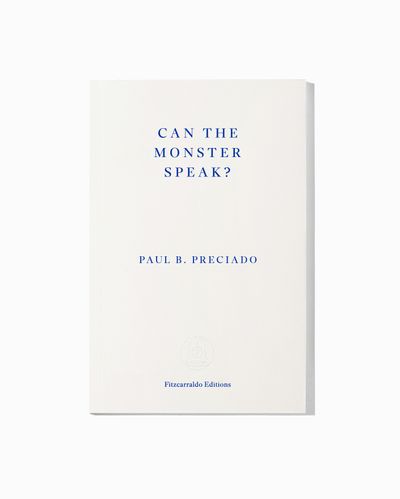In November 2019, Paul B. Preciado was invited to speak in front of 3,500 psychoanalysts at the École de la Cause Freudienne’s annual conference in Paris. Standing up in front of the profession for whom he is a ‘mentally ill person’ suffering from ‘gender dysphoria’, Preciado draws inspiration in his lecture from Kafka’s ‘A Report to an Academy’, in which a monkey tells an assembly of scientists that human subjectivity is a cage comparable to one made of metal bars. Demonstrating the discipline’s complicity with the ideology of sex, gender and sexual difference dating back to the colonial era, Preciado was heckled and booed and unable to finish. The lecture, filmed on smartphones, ended up published online, where fragments were transcribed, translated and published with no regard for exactitude. Eighteen months on, Can the Monster Speak? is published in a definitive translation for the first time.

Can the Monster Speak?
Translated by Frank Wynne
French paperback with flaps, 88 pages
Published 2 June 2021
Can the Monster Speak?
Translated by Frank Wynne
Esteemed ladies and gentlemen of the École de la Cause Freudienne, and I do not know whether it is worth also extending a greeting to all those who are neither ladies nor gentlemen, because I doubt that there is anyone among you who has publicly and legally repudiated sexual difference and been accepted as a fully fledged psychoanalyst, having successfully completed the process you refer to as ‘The Pass’, which permits you to practise as an analyst. In this, I am referring to a trans or non-binary psychoanalyst who is accepted by you as an expert. If such a person exists, allow me here and now tooffer this dear mutant my warmest greetings.
I have the honour of appearing before the Academy to offer a report on my life as a trans man. I do not know whether I will be able to offer data that you, ladies and gentlemen, academics and psychoanalysts, that you do not already know at first hand, given that you, like me, live within a regime of sex, gender and sexual difference. As a result, almost everything that I can say, you can observe for yourselves on one side or the other of the gender boundary. Although you doubtless consider yourselves to be natural men and women, and such an assumption may have prevented you from observing, from a safe distance, the political framework of which you are part. You will forgive me if, in the course of the story I am about to tell, I do not take for granted the existence of natural masculinity or femininity. Rest assured, you do not have to abandon your beliefs – and they are beliefs – in order to hear me out. Consider my argument, then go back to your ‘naturalized’ life, if you can.
To introduce myself, since you are a group of 3,500 psychoanalysts and I feel a little alone on this side of the stage, to take a running jump and hoist myself onto the shoulders of the master of metamorphosis, the greatest analyst of the excesses that hide behind the façade of scientific reason and of the madness commonly referred to as mental health: Franz Kafka.
In 1917, Franz Kafka wrote ‘Ein Bericht für eine Akademie’ – ‘A Report to an Academy’. The narrator of the text is an ape who, having learned human language, is appearing before an academy of the greatest scientific authorities to report to them on what human evolution has meant to him. The ape, who claims to be called Red Peter, explains how he was captured during a hunting expedition organized by the firm of Hagenbeck, transported to Europe aboard a steamship, is trained to perform in music halls, and how he later sprang into the community of human beings. Red Peter explains that in order to master human language and be accepted in the European society of his time, he had to forget his life as an ape. And how, in order to endure this oblivion and the violence of human society, he became an alcoholic. But the most interesting thing in Red Peter’s monologue is that Kafka does not present this process of humanization as a story of emancipation or of liberation from animality, but rather as a critique of colonial European humanism and its anthropological taxonomies. Once captured, the ape says he had no choice: if he did not wish to die locked up in a cage, he had to accept the ‘cage’ of human subjectivity.
Just as the ape Red Peter addressed himself to scientists, so today I address myself to you, the academicians of psychoanalysis, from my ‘cage’ as a trans man. I, a body branded by medical and juridical discourse as ‘transsexual’, characterized in most of your psychoanalytic diagnoses as the subject of an ‘impossible metamorphosis’, find myself, according to most of your theories, beyond neurosis, on the cusp of – or perhaps even within the bounds of – psychosis, being incapable, according to you, of correctly resolving an Oedipus complex or having succumbed to penis envy. And so, it is from the position assigned to me by you as a mentally ill person that I address you, an ape-human in a new era. I am the monster who speaks to you. The monster you have created with your discourse and your clinical practices. I am the monster who gets up from the analyst’s couch and dares to speak, not as a patient, but as a citizen, as your monstrous equal.
As a trans body, as a non-binary body, whose right to speak as an expert about my condition, or to produce a discourse or any form of knowledge about myself is not recognized by the medicinal profession, the law, psychoanalysis or psychiatry, I have done as Red Peter did, I have learned the language of Freud and Lacan, the language of the colonial patriarchy, your language, and I am here to address you.
(…)
‘Read here the words of a monster, brought to you unedited and without embellishment! Yes, it is true – the monster speaks! But he does not speak the language of castration and penis envy, nor is he fluent in lack and misrecognition. This monster speaks in his own words, and he does not speak as a subject, as an individual but rather as part of a constantly mutating “somatheque”. The monster announces the fall of the father, the end of Oedipus, the solidarity of the monsters. This short book is powerful, dangerous, important. Read it alone but share it with friends. Whisper its secrets and tell everyone its message – the monster of whom you speak, has left his cage.’
— Jack Halberstam, author of Trans*: A Quick and Quirky Guide to Gender Variability
‘Drawing on decades of radical trans theory, Preciado presents not just a searing critique of the psychoanalytic establishment, but also a bold challenge to it. Calling for a paradigm shift that will have an impact way beyond its intended field, Can the Monster Speak? demands its audience to think politically, granting new power to previously marginalized voices.’
— Juliet Jacques, author of Variations
‘The joy of reading Preciado, whether or not one has the theoretical tools to support or refute him, is the single and singular life that pulses in every word, and speaks to the individual within each of us and not – as all too often – to our persona.’
— Les Inrockuptibles
‘Written in a mutant language that owes much to Kafka, the master of metamorphoses, this radical text is a welcome insurrection against the psychoanalyst’s couch.’
— L’OBS
‘Can The Monster Speak? is a … beautifully worded short read, challenging both those who are dismissive of trans rights and those who can’t see beyond the binary options in transitioning from one gender role into the other, and presenting instead a radical future that encompasses the diversity of human beings.’
— Isabel Thomas, Buzz Magazine
‘Preciado … is a skilled rhetorician and distinctly anti-histrionic in his presentation of the facts of his experience…. The book, which could easily have lapsed into a study of an object, becomes the document in which the object argues to be recognised: that the trans-individual be considered valid as a person, not an illness.’
— Joshua Jones, 3am Magazine
‘Preciado, in laying bare the historically constructed epistemological cage of binary gender initially codified by Freud and reified by Lacan and generations of students, gives an archaeology of knowledge that is deft enough to position him as his own cohort’s answer to Foucault. Like Foucault, Preciado employs the historical to show how critical theory can in turn dissect, explode, and become the political.’
— Review 31
Paul B. Preciado is the author of Can the Monster Speak?, An Apartment on Uranus, Counter-Sexual Manifesto and Testo Junkie, among other books, and wrote and directed the film Orlando, My Political Biography. He is the Director of the Institute for Planetary Transition at LUMA Arles, France. He was born in Spain and lives in France. Dysphoria Mundi is his third book to appear with Fitzcarraldo Editions.
Frank Wynne has translated works by authors including Michel Houellebecq, Patrick Modiano, Jean-Baptiste Del Amo, Javier Cercas, Carlos Manuel Álvarez and Virginie Despentes. His work has earned various awards, including the IMPAC Dublin Literary Award and the Independent Foreign Fiction Prize; he has twice been awarded both the Scott Moncrieff Prize and the Premio Valle Inclán.




